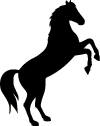Black Beauty Sample
This page features a sample of Black Beauty, adapted for children aged 9 and above by Books for Learning.
 The first place that I can well remember was a pleasant meadow with a wide field on one side of it and our master’s house on the other. While I was young I lived upon my mother’s milk, as I could not eat grass. In the daytime I ran by her side, and at night I lay down close by her. When it was hot we used to stand by the pond in the shade of the trees, and when it was cold we had a warm shed to shelter in.
The first place that I can well remember was a pleasant meadow with a wide field on one side of it and our master’s house on the other. While I was young I lived upon my mother’s milk, as I could not eat grass. In the daytime I ran by her side, and at night I lay down close by her. When it was hot we used to stand by the pond in the shade of the trees, and when it was cold we had a warm shed to shelter in.
My mother’s name was Duchess, and she was a wise old horse. Our master thought a great deal of her, and he himself was a good, kind man. He gave us good food, a good stable to live in, and his words were always kind. When my mother saw him at the gate she would neigh with joy and trot up to him. He would pat and stroke her and say, ‘Well, old Duchess, and how is your little Darkie?’ I was a dull black, so he called me Darkie. Then he would give me a piece of bread, which was very good, and sometimes he brought a carrot for my mother. All the horses would come to him, but I think we were his favorites. My mother always took him to town on a market day in a light gig1.
Old Daniel, our groom2, was just as gentle as our master, so we were well off. I had a very happy life as a young horse, with hardly a care in the world. I often went running with the other colts3 in the meadow and had great fun. We used to gallop all together round the field, as hard as we could go. It was good to be alive.
As I grew I became quite handsome. My coat became fine and soft and turned bright black. I had one white foot and a white star on my forehead. My master would not sell me till I was four years old. He said that colts ought not to be worked like horses till they were quite grown up.
When I was four years old, a friend of my master, Squire Gordon, came to look at me. He examined my eyes, my mouth and my legs. He felt them all down, and then I had to walk and trot and gallop before him. He seemed to like me, and said, ‘When he has been well broken in he will do very well.’ My master said he would break me in himself, and he lost no time about it, for the next day he began.
Everyone may not know what breaking in is, so I will describe it. It means to teach a horse to wear a saddle and bridle4, and to carry on his back a man, woman, or child; to go just the way they wish, and to go quietly. Besides this, he has to learn to wear a collar, and a breeching5, and to stand still while they are put on; then to have a cart or a buggy6 fixed behind, so that he cannot walk or trot without dragging it after him; and he must go fast or slow, just as his driver wishes. He must never start7 at what he sees, nor speak to other horses, nor bite, nor kick, nor have any will of his own, but always do his master’s will, even though he may be very tired or hungry. But the worst of all is, when his harness is on, he may neither jump for joy nor lie down if he is tired. So you see, this breaking in is a big thing.
- gig—a little carriage with two wheels.
- groom—a person who looks after horses.
- colts—young horses.
- bridle—straps around a horse’s head, to which the reins are attached.
- breeching—a strap that goes around the back of a horse when it is pulling a carriage.
- buggy—a small carriage that carries one or two people and usually has two wheels.
- start—jump in fright.